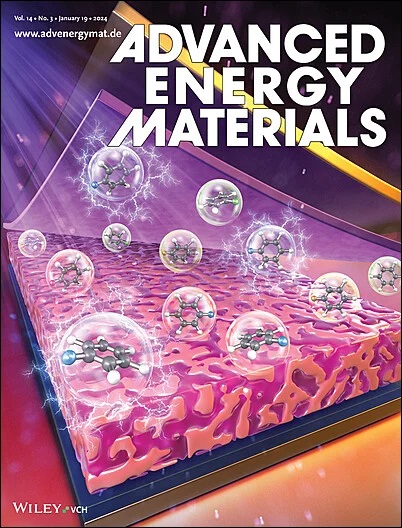Water-Thermal Self-Cycling Thermoelectric Hydrogel for Continuous Energy Harvesting from Body Heat
IF 24.4
1区 材料科学
Q1 CHEMISTRY, PHYSICAL
引用次数: 0
Abstract
The ability to continuously harvest energy from the human body has immense potential for powering wearable devices and biomedical systems, yet current thermoelectric hydrogels are constrained by rapid dehydration, limiting operational lifespans to less than 120 m and achieving temperature gradients of only ≈5 °C. Here, a self-cycling thermoelectric hydrogel is presented that addresses these challenges by autonomously regulating water-thermal cycling. This strategy achieves a maximum temperature gradient of 13 °C—more than 2.6 times the state-of-the-art—and maintains stable thermoelectric output for over 1500 min, the longest lifespan reported for such materials. Additionally, the hydrogel fully recovers hydration within 5 h, enabling robust reusability. Mechanistic studies reveal that optimized ionic interactions enhance thermal diffusion and elevate the Seebeck coefficient to 4.1 mV K−1. This study introduces a scalable design for wearable thermoelectric materials, paving the way for advancements in health monitoring, environmental sensing, and wearable electronics.

用于从人体热量中连续收集能量的水热自循环热电水凝胶
从人体持续获取能量的能力在为可穿戴设备和生物医学系统供电方面具有巨大的潜力,但目前的热电水凝胶受到快速脱水的限制,其使用寿命限制在120米以下,温度梯度仅为≈5°C。本文提出了一种自循环热电水凝胶,通过自主调节水热循环来解决这些挑战。该策略实现了13°c的最大温度梯度-超过目前水平的2.6倍-并保持稳定的热电输出超过1500分钟,这是此类材料报道的最长寿命。此外,水凝胶在5小时内完全恢复水合作用,具有很强的可重复使用性。机理研究表明,优化后的离子相互作用增强了热扩散,将塞贝克系数提高到4.1 mV K−1。本研究介绍了可穿戴热电材料的可扩展设计,为健康监测、环境传感和可穿戴电子产品的进步铺平了道路。
本文章由计算机程序翻译,如有差异,请以英文原文为准。
求助全文
约1分钟内获得全文
求助全文
来源期刊

Advanced Energy Materials
CHEMISTRY, PHYSICAL-ENERGY & FUELS
CiteScore
41.90
自引率
4.00%
发文量
889
审稿时长
1.4 months
期刊介绍:
Established in 2011, Advanced Energy Materials is an international, interdisciplinary, English-language journal that focuses on materials used in energy harvesting, conversion, and storage. It is regarded as a top-quality journal alongside Advanced Materials, Advanced Functional Materials, and Small.
With a 2022 Impact Factor of 27.8, Advanced Energy Materials is considered a prime source for the best energy-related research. The journal covers a wide range of topics in energy-related research, including organic and inorganic photovoltaics, batteries and supercapacitors, fuel cells, hydrogen generation and storage, thermoelectrics, water splitting and photocatalysis, solar fuels and thermosolar power, magnetocalorics, and piezoelectronics.
The readership of Advanced Energy Materials includes materials scientists, chemists, physicists, and engineers in both academia and industry. The journal is indexed in various databases and collections, such as Advanced Technologies & Aerospace Database, FIZ Karlsruhe, INSPEC (IET), Science Citation Index Expanded, Technology Collection, and Web of Science, among others.
 求助内容:
求助内容: 应助结果提醒方式:
应助结果提醒方式:


